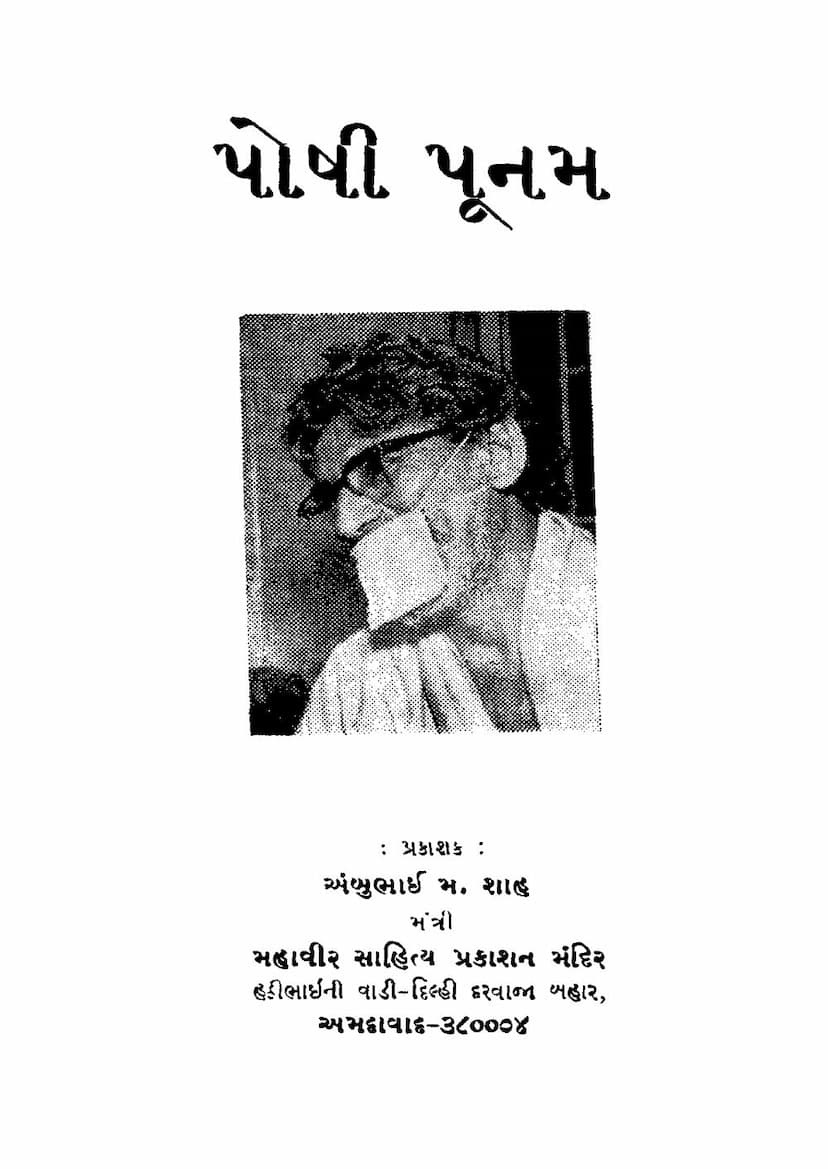Poshi Poonam
Added to library: September 2, 2025

Summary
This document, titled "Poshi Poonam," is a collection of speeches, resolutions, and reflections related to a social reform movement spearheaded by Santbal Muni. The primary focus is on the "Lokpal Patel" community and their upliftment, particularly in the Nalkantha region of Gujarat. The text highlights a significant gathering held in Manakal in 1939 (Samvat 1995), which marked the beginning of a major reform effort.
Here's a breakdown of the key themes and content:
The "Poshi Poonam" Gathering and its Significance:
- Initiation of Reform: The book details the "Lokpal Patel Sammelan" held on Poshi Poonam in Manakal. This event is described as the genesis of a reform movement aimed at improving the socio-economic and moral conditions of the community.
- Community Spirit and Participation: The event saw massive participation from villagers, including men, women, and children, who were deeply moved by the reformist ideals. The preparations and the event itself showcased a strong sense of community involvement and enthusiasm.
- Santbal Muni's Role: Santbal Muni is portrayed as the central figure, the guiding force and inspiration behind this movement. His teachings and vision are emphasized throughout the text.
- Social and Moral Reforms: The core of the reform agenda, as outlined in the resolutions passed during the Sammelan, includes:
- Abstinence from Alcohol and Tea: Strong emphasis is placed on giving up alcohol and tea, considered detrimental to health, finances, and well-being.
- Abandonment of Non-vegetarianism and Animal Slaughter: A resolution was passed to completely renounce meat-eating and animal slaughter, aligning with Jain principles of ahimsa (non-violence).
- Social Customs Reform: Several resolutions address problematic social customs, such as:
- Discouraging extravagant wedding expenses and dowry.
- Prohibiting the custom of consuming a "sweet meal" after a death.
- Ending the practice of singing vulgar songs during festivals.
- Addressing issues like adultery and demanding significant fines for such offenses.
- A call to stop conducting folk dramas (bhavaiya) in villages, encouraging instead devotional programs.
- Emphasis on Cleanliness and Service: The event itself began with a village cleanliness drive, where even educated individuals participated, setting a powerful example of service and hygiene.
- Education and Awareness: The need for education is highlighted, with a call for tailored curricula for rural areas.
- Community Harmony and Dispute Resolution: Resolutions advocate for resolving internal community disputes through internal mechanisms rather than approaching external courts, emphasizing the importance of Panchayats.
- Cow Protection (Goraksha): The importance of protecting cows and promoting dairy farming is stressed, with a lament on the decline of cattle population.
Key Themes and Philosophy:
- Lokpal (Guardian of the People): The term "Lokpal Patel" itself signifies a commitment to protecting and nurturing the people. The text explores the etymology and meaning of this term in relation to the community's identity and responsibilities.
- Dharma-based Social Reform: The movement is deeply rooted in Jain principles and a broader sense of righteous conduct. The emphasis is on living a life guided by ethical values, compassion, and non-violence.
- Self-Reliance and Community Empowerment: The reforms aim to empower the community by fostering self-reliance, eliminating wasteful practices, and promoting healthy living habits.
- Inspiration from Leaders: The influence of figures like Mahatma Gandhi and the broader Swaraj movement is evident, with the text drawing parallels between the national struggle for independence and the community's quest for social liberation.
- Purity and Simplicity: The reformist ideals champion a simple, pure, and virtuous lifestyle, free from vices and harmful practices.
- Call to Action: The book serves as a call to action for the community to embrace these reforms wholeheartedly and work towards building a better society.
Specific References and Mentions:
- Ravishankar Maharaj: A respected social reformer, his introductory message is included, emphasizing the importance of faith and understanding Santbal Muni's guidance.
- Chhaganbhai Desai and Dahyabhai Patel: They are acknowledged as instrumental in organizing the Manakal conference.
- Various individuals and organizations: Several individuals and organizations are mentioned for their support and participation in the reform efforts, including the Bavla Youth Mandal, Mahajans, and other community leaders.
- Historical Context: The text occasionally refers to historical events and traditions, such as the legacy of Kshatriyas and their duties, to contextualize the reform movement.
In essence, "Poshi Poonam" is a significant document chronicling a period of profound social awakening and reform within the Patel community, guided by the spiritual and ethical principles of Jainism as articulated by Santbal Muni. It is a testament to the power of collective action and moral conviction in transforming society.